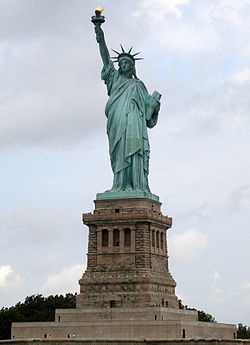 Ban on Immigration is Simply Wrong Ban on Immigration is Simply Wrong
"Give me your tired, your poor, your huddled masses yearning
to breathe free, the wretched refuse of your teeming shore.
Send these, the homeless, tempest-tossed to me, I lift my
lamp beside the golden door!"
When did those words lose their meaning?
Now we are denying entry to America to those who went
through the visa process, did everything they were required
to do, and became 100% legal based on immigration law. This
includes scientists, students returning to college, and
family members who can no longer be with their families in
this country. The America I knew, and everything it stood
for, is gone.
The Trump executive order 13769 is a direct violation of the
First Amendment of the United States Constitution.
Everything you need to know about the ban, along with the
full reformatted original text. |
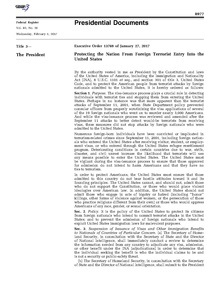 Executive
Order 13769 Executive
Order 13769
Executive Order 13769, entitled "Protecting the Nation from
Foreign Terrorist Entry into the United States", is an
executive order that was signed by U.S. President Donald
Trump on January 27, 2017. The order limited the number of
refugee arrivals to the U.S. to 50,000 for 2017 and
suspended the U.S. Refugee Admissions Program (USRAP) for
120 days, after which the program would be conditionally
resumed for individual countries while prioritizing refugee
claims from persecuted minority religions. The order also
indefinitely suspended the entry of Syrian refugees.
Further, the order suspended the entry of alien nationals
from seven Muslim-majority countries — Iraq, Iran, Libya,
Somalia, Sudan, Syria and Yemen — for 90 days, after which
an updated list will be made. The order allows exceptions to
these suspensions on a case-by-case basis. The Department of
Homeland Security later exempted U.S. lawful permanent
residents (green card holders). |
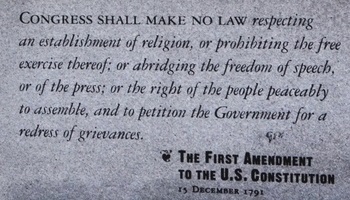 First
Amendment First
Amendment
Correct me if I am wrong, but this executive order is a
direct violation of the First Amendment of the United States
Constitution. The first amendment states the following:
Congress shall make no law respecting an establishment
of religion, or prohibiting the free exercise thereof; or
abridging the freedom of speech, or of the press; or the
right of the people peaceably to assemble, and to petition
the Government for a redress of grievances.
The Establishment Clause is especially important here, since
it is a limitation placed upon the United States Congress,
preventing it from passing legislation respecting an
establishment of religion. More importantly, the second half
of the Establishment Clause inherently prohibits the
government from preferring any one religion over another. |
 Establishment
Clause Establishment
Clause
Now let's do a little test. Put both of your hands directly
out in front of you. Your left hand represents Christianity
while your right hand represents Islam. Now raise your left
hand, thereby elevating Christianity to a higher level, in
other words preferring Christianity over Islam, an obvious
and direct violation of the first amendment. Now put your
hands back to their original, same level positions. This
time lower your right hand relative to your left hand,
resulting in your left hand, Christianity, being at a higher
level than your right hand, Islam, again resulting in a
preference for Christianity over Islam. This is analogous to
the immigration ban which, in essence, showed the preference
of other religions over Islam, since the executive order
specifically singled out countries which are predominantly
Muslim. This is a direct violation of the Establishment
clause of the First Amendment, making Executive Order 13769
unconstitutional. |
 Impeachment
Time? Impeachment
Time?
The compelling question here is, if in fact this is a direct
violation of the U.S. constitution, then why isn't anyone
talking about impeachment at this point. Gosh, Clinton was
subject to impeachment proceedings for doing the nasty with
Monica Lewinsky and lying about it. Hardly a national
security issue, and certainly not an act that resulted in
worldwide protests and chaos around the United States. Yet
for some reason, Trump appears to be above the law, and
untouchable. Certainly seems to be a lot more going on than
meets the eye. |
|
|
Immigration and travel ban timeline
The following is a timeline of the immigration ban with my
take on what this all means. As this situation is ongoing,
frequent updates will be added. If you know of any pertinent
information, or new developments, please post your
information at the bottom of this page. |
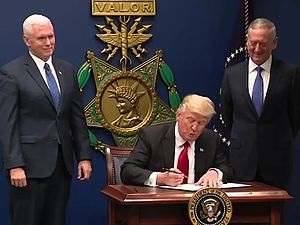 Friday, January 27, 2017 Friday, January 27, 2017
Trump signs the executive order on immigration
The executive order entitled, “Protecting the nation from foreign
terrorist entry into the United States,” bars all
people from Iraq, Syria, Iran, Sudan, Libya, Yemen, and
Somalia from entering the United States for 90 days. The
action also orders the suspension of the US refugee program
for 120 days and indefinitely blocks Syrian refugees from
entering the United States.
Saturday, January 28, 2017
ACLU files a lawsuit
The American Civil Liberties Union
(ACLU) filed a lawsuit on behalf of two Iraqis who were
detained at New York's John F. Kennedy International Airport
on January 27, hours after the order was signed. The
lawsuit said that the executive order was in violation of
procedural due process under the Fifth Amendment to the
United States Constitution, the Immigration and Nationality
Act, the Convention Against Torture, the Foreign Affairs
Reform and Restructuring Act of 1998, and the Administrative
Procedure Act. The Council on American–Islamic Relations
(CAIR) also said that it planned to file a lawsuit.
U.S. District Judge from New York
blocks order
At about 9:00 p.m. EST, Ann Donnelly, a
U.S. District Judge from the Eastern District of New York,
blocked part of the order, ruling that refugees, naturalized
citizens, visa holders, and green card holders from the
seven affected countries could not be sent back to their
home countries. Donnelly was
acting in her capacity as miscellaneous duty judge, and the
case was assigned to Judge Carol Bagley Amon the following
Monday, along with other related cases in the same
district. The decision covers airport detainees and
those already in transit, estimated to number between 100
and 200. Although the court found a "strong
likelihood" that the enforcement of the order violated the
detainees' constitutional rights, the court did not
address whether the order is facially constitutional. The
stay will be in effect until a hearing scheduled for
February 21.
Sunday, January 29, 2017
U.S. District Judges apply
protections
At 1:51 a.m. EST, U.S. District Judge
Allison Burroughs and Magistrate Judge Judith Dein ordered
that the same group of people shall not be detained or
removed, and explicitly applied the same protections to U.S.
permanent residents. Specially, the order barred the
detention of those "who, absent the Executive Order, would
be legally authorized to enter the United States".
Further, the judges ordered the U.S. Customs and Border
Protection to notify airlines with flights arriving at Logan
Airport of the court order and "the fact that individuals on
these flights will not be detained or returned based solely
on the basis of the Executive Order". This court order
restores the ability for lawful immigrants from the seven
barred nations to enter the U.S. through Logan Airport.
Side Note -
Maura Healey and other AGs issued this statement today:
“As the chief legal officers for over 130 million Americans
and foreign residents of our states, we condemn President
Trump’s unconstitutional, un-American and unlawful executive
order and will work together to ensure the federal
government obeys the Constitution, respects our history as a
nation of immigrants, and does not unlawfully target anyone
because of their national origin or faith,” |
 January 30, 2017 January 30, 2017
Attorney General Sally Yates bars
Justice Department
Acting Attorney General Sally Yates,
an Obama administration appointee holding the position
temporarily while a Trump nominee is confirmed, barred the
Justice Department from defending the executive order in
court. According to Yates, the department's Office
of Legal Counsel conducted a review of the order in order to
determine if it was "lawful on its face", but she said that
the review did not address the order's effects, which she
felt were not in keeping "with this institution's solemn
obligation to always seek justice and stand for what is
right". She went on further to say that, regardless of
the Office of Legal Counsel's opinion, she was not
"convinced that the executive order is lawful".
This was a prime example of "going out in style", and showed
the integrity of a woman who holds the law above the whims
and unconstitutional executive orders of a maniacal
autocrat. Senate Minority Leader Chuck Schumer called
Yates's actions "a profile in courage. It was a brave act
and a right act," he stated. |
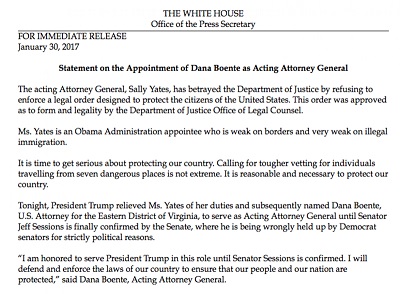 Sally
Yates relieved of duties Sally
Yates relieved of duties
After
Yates spoke against Trump's refugee ban, however, Trump
quickly relieved her of her duties, calling her statement a
"betrayal" to the administration. He replaced her with
Dana J. Boente, the United States Attorney for the Eastern
District of Virginia. In addition, acting director of
the U.S. Immigration and Customs Enforcement (ICE) Daniel
Ragsdale was replaced with Thomas Homan soon after Yates's
removal. Can you say YOUR FIRED !!!!
This leadership alteration became known as the
Monday Night Massacre.
In response to the firing of Yates and the demotion of
Ragsdale, a bipartisan group of more than
70 former Assistant U.S. Attorneys—including 50 who had
served under a Republican administration—defended the
decision of the former acting Attorney General. In
their statement, they said:
"Struck by one stunning headline after another, we stopped to
think: if we were called upon to defend the Executive Order,
could we do it within the guidelines we learned and lived by
as lawyers for the United States? We could not. We could not
candidly tell a court, consistent with these principles,
that the Executive Order is not, in fact, a thinly veiled
attempt to exclude Muslims from certain countries based on
their religion. We could not candidly tell a court that the
United States has the right to turn away refugees fleeing
grave danger, even though they have already been fully
vetted and approved for admission. (...) If asked whether
the language of the Executive Order would permit the
President to give preference to Christians over Muslims for
admission to the United States, a position the President has
publicly expressed, we would have to say, yes, the language
would allow that. If asked whether such a religious
preference comports with our Constitution, we would have to
say we do not believe so."
I can only begin to imagine to what degree American
democracy will deteriorate in the months to come when the
President of the United States of America simply eliminates
those who oppose him, even though such opposition is in the
best interests of our country, a defense of our
constitution, and an upholding of American values. Rep. John
Conyers criticized the decision to fire her: "If dedicated
government officials deem [Trump's] directives to be
unlawful and unconstitutional, he will simply fire them as
if government is a reality show." |
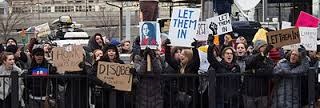 Wednesday, February 1, 2017 Wednesday, February 1, 2017
District Judge André Birotte Jr. in
the Central District of California issued a preliminary
injunction in a case brought on behalf of 28 Yemeni
immigrants suspended in transit to the US as a result of the
executive order. The ruling, worded to apply more
broadly than to the case's plaintiffs alone, said that
anyone "from Iran, Iraq, Libya, Somalia, Sudan, Syria and
Yemen with a valid immigrant visa" be allowed to enter the
United States. However, as a State Department official had
previously issued a memo "provisionally" revoking all
immigrant visas after Trump issued the executive order, it
was unclear whether the ruling would in practice apply to
anyone. |
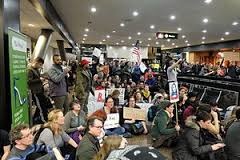 Thursday,
February 2, 2017 Thursday,
February 2, 2017
A federal judge in Detroit ruled that the order not be
applied to permanent residents nationwide and permanently,
given the White House's previous declaration that the order
did not apply to permanent residents, in the case
Arab-American Civil Rights League v. Trump. |
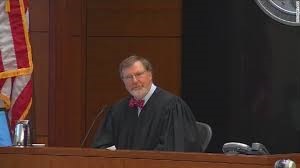 Friday,
February 3, 2017 Friday,
February 3, 2017
District Judge James Robart issued a
ruling temporarily blocking major portions of the executive
order; he said that the plaintiffs had "demonstrate[d]
immediate and irreparable injury," and were likely to
succeed in their challenge to the federal defendants.
Citing a previous Fifth Circuit decision that affirmed a Texas
district court's decision to block an Obama administration
immigration program nationally, Robart explicitly wrote his
judgment to apply nationwide. (See United States
v. Texas at Background, subsection "United States Court of
Appeals".) Robart's ruling denied the federal defendants the
ability to enforce the 90-day travel ban from the seven
countries, as well as all limits on refugee acceptance
imposed by the executive order. In response to Robart's
ruling, the Department of Homeland Security said on February
4 that it had stopped enforcing the executive order, while
the State Department activated visas that had been
previously suspended.
Acting on a request from two states, Washington and
Minnesota, Judge Robart temporarily banned the
administration from enforcing two parts of Mr. Trump’s
order: its 90-day suspension of entry into the United States
of people from Iran, Iraq, Libya, Somalia, Sudan, Syria and
Yemen, and its limits on accepting refugees, including “any
action that prioritizes the refugee claims of certain
religious minorities.”
Judge Robart’s order allowed people from the seven countries
who had been authorized to travel, along with vetted
refugees from all nations, to enter the country.
In response to Judge Robart's ruling
temporarily blocking the executive order nationwide, the
Justice Department asked for an emergency stay to honor
President Trump's executive action on immigration
admissions, according to a statement released by the White
House's Office of the Press Secretary. The United States
Court of Appeals for the Ninth Circuit denied Trump's
immediate petition to stay the temporary restraining order
from the Federal District Court in Washington State.
District Judge Nathaniel M. Gorton
declined to extend the order past its scheduled expiration,
saying that "because plaintiffs have not demonstrated that
they are likely to succeed on the merits of any of their
claims, an extension of the restraining order at the present
time is not warranted." He based his judgment on the
fact the Trump administration had excluded green card
holders named in the suit from the executive order since the
suit had been filed, and that visa-holding immigrants had a
lower standard of legal protection. |
|
|
THE SAGA CONTINUES |
|
|
Executive Order 13769 Reformatted
The following is the text of Executive Order 13769, copied
verbatim from the original, and reformatted here for ease of
understanding. For those of you so inclined, peruse at your
convenience. I already skimmed through much of this and plan
to read in much more detail and provide side notes. Quite
honestly this executive order constitutes an impeachable
offense. Hopefully the house has enough sense to realize
this and throw the bum out. The term "DUMP TRUMP" has never
had more meaning than now. |
|
Executive Order 13769 of January 27,
2017
Protecting the Nation From Foreign
Terrorist Entry Into the United States
By the authority vested in me as President by the
Constitution and laws of the United States of America,
including the Immigration and Nationality Act (INA), 8
U.S.C. 1101 et seq., and section 301 of title 3, United
States Code, and to protect the American people from
terrorist attacks by foreign nationals admitted to the
United States, it is hereby ordered as follows:
Section 1. Purpose.
The visa-issuance process plays a crucial role in detecting
individuals with terrorist ties and stopping them from
entering the United States. Perhaps in no instance was that
more apparent than the terrorist attacks of September 11,
2001, when State Department policy prevented consular
officers from properly scrutinizing the visa applications of
several of the 19 foreign nationals who went on to murder
nearly 3,000 Americans. And while the visa-issuance process
was reviewed and amended after the September 11 attacks to
better detect would-be terrorists from receiving visas,
these measures did not stop attacks by foreign nationals who
were admitted to the United States.
Numerous foreign-born individuals have been convicted or
implicated in terrorism-related crimes since September 11,
2001, including foreign nationals who entered the United
States after receiving visitor, student, or employment
visas, or who entered through the United States refugee
resettlement program. Deteriorating conditions in certain
countries due to war, strife, disaster, and civil unrest
increase the likelihood that terrorists will use any means
possible to enter the United States. The United States must
be vigilant during the visa-issuance process to ensure that
those approved for admission do not intend to harm Americans
and that they have no ties to terrorism.
In order to protect Americans, the United States must ensure
that those admitted to this country do not bear hostile
attitudes toward it and its founding principles. The United
States cannot, and should not, admit those who do not
support the Constitution, or those who would place violent
ideologies over American law. In addition, the United States
should not admit those who engage in acts of bigotry or
hatred (including ‘‘honor’’ killings, other forms of
violence against women, or the persecution of those who
practice religions different from their own) or those who
would oppress Americans of any race, gender, or sexual
orientation.
Sec. 2. Policy. It is
the policy of the United States to protect its citizens from
foreign nationals who intend to commit terrorist attacks in
the United States; and to prevent the admission of foreign
nationals who intend to exploit United States immigration
laws for malevolent purposes.
Sec. 3. Suspension of
Issuance of Visas and Other Immigration Benefits to
Nationals of Countries of Particular Concern.
(a) The Secretary of Homeland Security, in consultation with
the Secretary of State and the Director of National
Intelligence, shall immediately conduct a review to
determine the information needed from any country to
adjudicate any visa, admission, or other benefit under the
INA (adjudications) in order to determine that the
individual seeking the benefit is who the individual claims
to be and is not a security or public-safety threat.
(b) The Secretary of Homeland Security, in consultation with
the Secretary of State and the Director of National
Intelligence, shall submit to the President a report on the
results of the review described in subsection (a) of this
section, including the Secretary of Homeland Security’s
determination of the information needed for adjudications
and a list of countries that do not provide adequate
information, within 30 days of the date of this order. The
Secretary of Homeland Security shall provide a copy of the
report to the Secretary of State and the Director of
National Intelligence.
(c) To temporarily reduce investigative burdens on relevant
agencies during the review period described in subsection
(a) of this section, to ensure the proper review and maximum
utilization of available resources for the screening of
foreign nationals, and to ensure that adequate standards are
established to prevent infiltration by foreign terrorists or
criminals, pursuant to section 212(f) of the INA, 8 U.S.C.
1182(f), I hereby proclaim that the immigrant and
nonimmigrant entry into the United States of aliens from
countries referred to in section 217(a)(12) of the INA, 8
U.S.C. 1187(a)(12), would be detrimental to the interests of
the United States, and I hereby suspend entry into the
United States, as immigrants and nonimmigrants, of such
persons for 90 days from the date of this order (excluding
those foreign nationals traveling on diplomatic visas, North
Atlantic Treaty Organization visas, C–2 visas for travel to
the United Nations, and G–1, G–2, G–3, and G–4 visas).
(d) Immediately upon receipt of the report described in
subsection (b) of this section regarding the information
needed for adjudications, the Secretary of State shall
request all foreign governments that do not supply such
information to start providing such information regarding
their nationals within 60 days of notification.
(e) After the 60-day period described in subsection (d) of
this section expires, the Secretary of Homeland Security, in
consultation with the Secretary of State, shall submit to
the President a list of countries recommended for inclusion
on a Presidential proclamation that would prohibit the entry
of foreign nationals (excluding those foreign nationals
traveling on diplomatic visas, North Atlantic Treaty
Organization visas, C–2 visas for travel to the United
Nations, and G–1, G–2, G–3, and G–4 visas) from countries
that do not provide the information requested pursuant to
subsection (d) of this section until compliance occurs.
(f) At any point after submitting the list described in
subsection (e) of this section, the Secretary of State or
the Secretary of Homeland Security may submit to the
President the names of any additional countries recommended
for similar treatment.
(g) Notwithstanding a suspension pursuant to subsection (c)
of this section or pursuant to a Presidential proclamation
described in subsection (e) of this section, the Secretaries
of State and Homeland Security may, on a case-by-case basis,
and when in the national interest, issue visas or other
immigration benefits to nationals of countries for which
visas and benefits are otherwise blocked.
(h) The Secretaries of State and Homeland Security shall
submit to the President a joint report on the progress in
implementing this order within 30 days of the date of this
order, a second report within 60 days of the date of this
order, a third report within 90 days of the date of this
order, and a fourth report within 120 days of the date of
this order.
Sec. 4. Implementing
Uniform Screening Standards for All Immigration Programs.
(a) The Secretary of State, the Secretary of Homeland
Security, the Director of National Intelligence, and the
Director of the Federal Bureau of Investigation shall
implement a program, as part of the adjudication process for
immigration benefits, to identify individuals seeking to
enter the United States on a fraudulent basis with the
intent to cause harm, or who are at risk of causing harm
subsequent to their admission. This program will include the
development of a uniform screening standard and procedure,
such as in-person interviews; a database of identity
documents proffered by applicants to ensure that duplicate
documents are not used by multiple applicants; amended
application forms that include questions aimed at
identifying fraudulent answers and malicious intent; a
mechanism to ensure that the applicant is who the applicant
claims to be; a process to evaluate the applicant’s
likelihood of becoming a positively contributing member of
society and the applicant’s ability to make contributions to
the national interest; and a mechanism to assess whether or
not the applicant has the intent to commit criminal or
terrorist acts after entering the United States.
(b) The Secretary of Homeland Security, in conjunction with
the Secretary of State, the Director of National
Intelligence, and the Director of the Federal Bureau of
Investigation, shall submit to the President an initial
report on the progress of this directive within 60 days of
the date of this order, a second report within 100 days of
the date of this order, and a third report within 200 days
of the date of this order.
Sec. 5. Realignment of the
U.S. Refugee Admissions Program for Fiscal
Year 2017.
(a) The Secretary of State shall suspend the U.S. Refugee
Admissions Program (USRAP) for 120 days. During the 120-day
period, the Secretary of State, in conjunction with the
Secretary of Homeland Security and in consultation with the
Director of National Intelligence, shall review the USRAP
application and adjudication process to determine what
additional procedures should be taken to ensure that those
approved for refugee admission do not pose a threat to the
security and welfare of the United States, and shall
implement such additional procedures. Refugee applicants who
are already in the USRAP process may be admitted upon the
initiation and completion of these revised procedures. Upon
the date that is 120 days after the date of this order, the
Secretary of State shall resume USRAP admissions only for
nationals of countries for which the Secretary of State, the
Secretary of Homeland Security, and the Director of National
Intelligence have jointly determined that such additional
procedures are adequate to ensure the security and welfare
of the United States.
(b) Upon the resumption of USRAP admissions, the Secretary
of State, in consultation with the Secretary of Homeland
Security, is further directed to make changes, to the extent
permitted by law, to prioritize refugee claims made by
individuals on the basis of religious-based persecution,
provided that the religion of the individual is a minority
religion in the individual’s country of nationality. Where
necessary and appropriate, the Secretaries of State and
Homeland Security shall recommend legislation to the
President that would assist with such prioritization.
(c) Pursuant to section 212(f) of the INA, 8 U.S.C. 1182(f),
I hereby proclaim that the entry of nationals of Syria as
refugees is detrimental to the interests of the United
States and thus suspend any such entry until such time as I
have determined that sufficient changes have been made to
the USRAP to ensure that admission of Syrian refugees is
consistent with the national interest.
(d) Pursuant to section 212(f) of the INA, 8 U.S.C. 1182(f),
I hereby proclaim that the entry of more than 50,000
refugees in fiscal year 2017 would be detrimental to the
interests of the United States, and thus suspend any such
entry until such time as I determine that additional
admissions would be in the national interest.
(e) Notwithstanding the temporary suspension imposed
pursuant to subsection (a) of this section, the Secretaries
of State and Homeland Security may jointly determine to
admit individuals to the United States as refugees on a
case-by-case basis, in their discretion, but only so long as
they determine that the admission of such individuals as
refugees is in the national interest—including when the
person is a religious minority in his country of nationality
facing religious persecution, when admitting the person
would enable the United States to conform its conduct to a
preexisting international agreement, or when the person is
already in transit and denying admission would cause undue
hardship—and it would not pose a risk to the security or
welfare of the United States.
(f) The Secretary of State shall submit to the President an
initial report on the progress of the directive in
subsection (b) of this section regarding prioritization of
claims made by individuals on the basis of religious-based
persecution within 100 days of the date of this order and
shall submit a second report within 200 days of the date of
this order.
(g) It is the policy of the executive branch that, to the
extent permitted by law and as practicable, State and local
jurisdictions be granted a role in the process of
determining the placement or settlement in their
jurisdictions of aliens eligible to be admitted to the
United States as refugees. To that end, the Secretary of
Homeland Security shall examine existing law to determine
the extent to which, consistent with applicable law, State
and local jurisdictions may have greater involvement in the
process of determining the placement or resettlement of
refugees in their jurisdictions, and shall devise a proposal
to lawfully promote such involvement.
Sec. 6. Rescission of
Exercise of Authority Relating to the Terrorism Grounds
of Inadmissibility.
The Secretaries of State and Homeland Security shall, in
consultation with the Attorney General, consider rescinding
the exercises of authority in section 212 of the INA, 8
U.S.C. 1182, relating to the terrorism grounds of
inadmissibility, as well as any related implementing
memoranda.
Sec. 7. Expedited
Completion of the Biometric Entry-Exit Tracking System.
(a) The Secretary of Homeland Security shall expedite the
completion and implementation of a biometric entry-exit
tracking system for all travelers to the United States, as
recommended by the National Commission on Terrorist Attacks
Upon the United States.
(b) The Secretary of Homeland Security shall submit to the
President periodic reports on the progress of the directive
contained in subsection (a) of this section. The initial
report shall be submitted within 100 days of the date of
this order, a second report shall be submitted within 200
days of the date of this order, and a third report shall be
submitted within 365 days of the date of this order.
Further, the Secretary shall submit a report every 180 days
thereafter until the system is fully deployed and
operational.
Sec. 8. Visa Interview
Security.
(a) The Secretary of State shall immediately suspend the
Visa Interview Waiver Program and ensure compliance with
section 222 of the INA, 8 U.S.C. 1202, which requires that
all individuals seeking a nonimmigrant visa undergo an
in-person interview, subject to specific statutory
exceptions.
(b) To the extent permitted by law and subject to the
availability of appropriations, the Secretary of State shall
immediately expand the Consular Fellows Program, including
by substantially increasing the number of Fellows,
lengthening or making permanent the period of service, and
making language training at the Foreign Service Institute
available to Fellows for assignment to posts outside of
their area of core linguistic ability, to ensure that
non-immigrant visa-interview wait times are not unduly
affected.
Sec. 9. Visa Validity
Reciprocity.
The Secretary of State shall review all nonimmigrant visa
reciprocity agreements to ensure that they are, with respect
to each visa classification, truly reciprocal insofar as
practicable with respect to validity period and fees, as
required by sections 221(c) and 281 of the INA, 8 U.S.C.
1201(c) and 1351, and other treatment. If a country does not
treat United States nationals seeking nonimmigrant visas in
a reciprocal manner, the Secretary of State shall adjust the
visa validity period, fee schedule, or other treatment to
match the treatment of United States nationals by the
foreign country, to the extent practicable.
Sec. 10. Transparency and
Data Collection.
(a) To be more transparent with the American people, and to
more effectively implement policies and practices that serve
the national interest, the Secretary of Homeland Security,
in consultation with the Attorney General, shall, consistent
with applicable law and national security, collect and make
publicly available within 180 days, and every 180 days
thereafter:
(i) information regarding the number of foreign nationals in
the United States who have been charged with
terrorism-related offenses while in the United States;
convicted of terrorism-related offenses while in the United
States; or removed from the United States based on terrorism
related activity, affiliation, or material support to a
terrorism-related organization, or any other national
security reasons since the date of this order or the last
reporting period, whichever is later;
(ii) information regarding the number of foreign nationals in
the United States who have been radicalized after entry into
the United States and engaged in terrorism-related acts, or
who have provided material support to terrorism-related
organizations in countries that pose a threat to the United
States, since the date of this order or the last reporting
period, whichever is later; and
(iii) information regarding the number and types of acts of
gender-based violence against women, including honor
killings, in the United States by foreign nationals, since
the date of this order or the last reporting period,
whichever is later; and
(iv) any other information relevant to public safety and
security as determined by the Secretary of Homeland Security
and the Attorney General, including information on the
immigration status of foreign nationals charged with major
offenses.
(b) The Secretary of State shall, within one year of the
date of this order, provide a report on the estimated
long-term costs of the USRAP at the Federal, State, and
local levels.
Sec. 11. General
Provisions.
(a) Nothing in this order shall be construed
to impair or otherwise affect:
(i) the authority granted by law to an executive department
or agency,
or the head thereof; or
(ii) the functions of the Director of the Office of
Management and Budget
relating to budgetary, administrative, or legislative
proposals.
(b) This order shall be implemented consistent with
applicable law and
subject to the availability of appropriations.
(c) This order is not intended to, and does not, create any
right or benefit,
substantive or procedural, enforceable at law or in equity
by any party
against the United States, its departments, agencies, or
entities, its officers,
employees, or agents, or any other person. |
|
|
TELL YOUR STORY
Were you, or your family, or someone you know, affected by
the Trump travel ban? Then please post your story below. The
American public, especially Trump supporters, need to be
educated as to the suffering endured by individuals and
families as a result of this unconstitutional executive
order. |
|
|
|
Additional Reading |
|
|
|
|